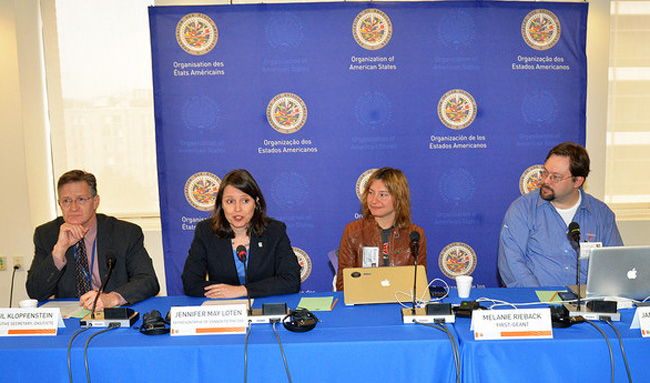|

|
 |
|
Last Updated: Feb 13, 2017 - 1:45:37 AM |

From left to right:
Neil Klopfenstein, Executive Secretary of the Inter-American Committee against Terrorism (CICTE)
Jennifer May Alice Loten, Counselor, Interim Representative of Canada to the OAS
Melanie Rieback, First - Geant
Jan Phillip Velders, First Geant
Date: March 09, 2015
Place: Washington, DC
Credit: Maria Patricia Leiva/OAS
|
The
Organization of American States (OAS) today began a training course on
Computer Security Incident Response Teams (CSIRTs) aimed at technical
staff responsible for the development and management of CSIRTs from
Dominica, the Dominican Republic, Honduras, Nicaragua, Saint Kitts and
Nevis, Suriname and Trinidad and Tobago, at its headquarters in
Washington, DC.
The opening of the event, organized by the Cyber Security Program
of the Inter-American Committee against Terrorism (CICTE) of the OAS,
with the support of the Forum of Incident Response and Security Teams
(FIRST) and the GEANT Association, included remarks by the Interim
Representative of Canada to the OAS, Jennifer Loten, who said that
recent decades "have demonstrated that the internet is playing an
increasingly important role in the public and private sectors,
fundamentally altering the way of doing business and delivering services
and shaping the new social and cultural vibrancy of our countries." In
that context, she continued, a secure and reliable internet "is a
necessary element to advance our competitiveness in the global market,
as individuals and businesses rely on secure and stable digital
infrastructure for business transactions and the protection of personal
and business information."
The delegate of Canada highlighted the alarming increase in the
number of cyber incidents directed against all levels of society
worldwide, and outlined her country's commitment in the fight against
cyber crime and risk mitigation. "Dealing with cyberthreats in isolation
is not enough, so Canada is committed to working together with other
countries to ensure that we have a common approach and thus are able to
prevent, monitor and respond to them," she said. In particular, Loten
reaffirmed the commitment of the Canadian government to support national
efforts of the countries of the hemisphere in the fight against crime
and cyber terrorism through the CICTE of the OAS. "OAS/CICTE has been
instrumental in these efforts and we believe that its work is key to
continue providing the technical expertise needed by countries in the
region, and to continue fostering collaboration and exchange and
identifying innovative ways to face these complex challenges," she
added.
For his part, the Executive Secretary of the OAS/CICTE, Neil
Klopfenstein, said that the meeting is "an example of transregional
cooperation and one of the main elements of the training initiatives
developed by CICTE." He also encouraged participants to expand their
network of interpersonal collaboration and build new ties of partnership
and trust.
The OAS/CICTE official explained that the course is for staff from
the OAS member countries working in the field of Computer Security
Incident Response and who wish to gain a good grounding in the main
aspects of working in an incident handling and response team specialized
in the field.
The course, financially supported by Canada, is based on the
"TRANSITS" methodology, developed by Terena, an organization dedicated
to the development and progress of Internet technologies, that brings
together managers, technical specialists and other community research
networks to promote the exchange of knowledge and experience in the area
of research and education networks. Instruction was given by Melanie
Rieback from Radically Open Security, and Jean-Phillip Velders from the
University of Amsterdam.
A gallery of photos of the event is available here.
For more information, please visit the OAS Website at www.oas.org.

© Copyright 2015 by thebahamasweekly.com
Top of Page
|
|
 |

|
